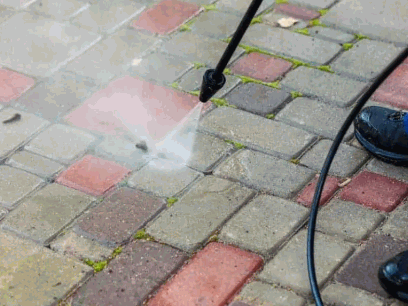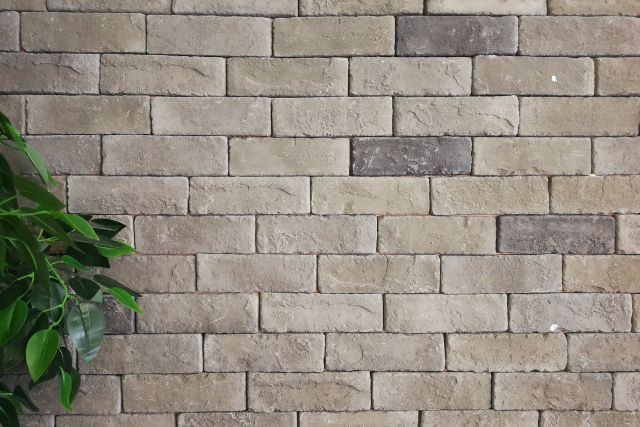Are you finding it difficult to clean your bricks outside? Do not worry, as you are not the only one. Numerous homeowners encounter the difficulty of removing stubborn stains and dirt from their brick surfaces. In this article, you will discover how to clean bricks effectively by using a common household ingredient - vinegar. By using vinegar, you can save money and avoid the use of strong chemicals that can be harmful to the environment and your health. Let's delve into the specifics of this unconventional yet efficient cleaning solution.
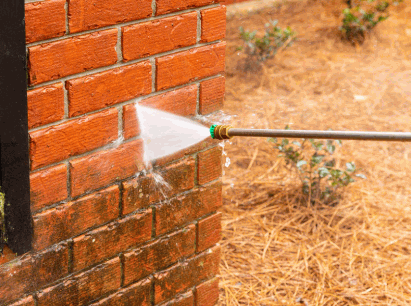
Why Clean Bricks With Vinegar?
Cleaning bricks with vinegar is a popular choice due to its effectiveness and affordability. Vinegar's acidity helps break down dirt, grime, and stains on the surface of the bricks. It is a natural and eco-friendly alternative to harsh chemical cleaners. Additionally, vinegar has antimicrobial properties that can help kill bacteria and prevent the growth of mold and mildew on the bricks. Overall, cleaning bricks with vinegar is a smart choice for those seeking a safe and efficient cleaning solution.
Check out: Amazing Benefits For Using Vinegar To Clean
What Supplies Do You Need?
To clean bricks with vinegar, you'll need a few supplies. Here is a list of the items you'll need:
- Vinegar: You'll need white vinegar, which is a natural cleaning agent.
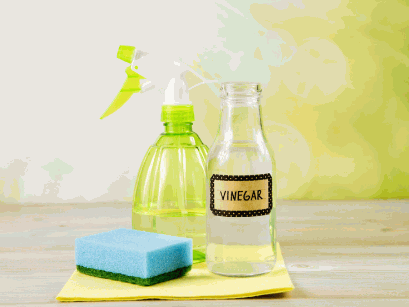
- Water: Dilute the vinegar with water to create a cleaning solution.

- Spray bottle: Use a spray bottle to apply the vinegar solution onto the bricks.
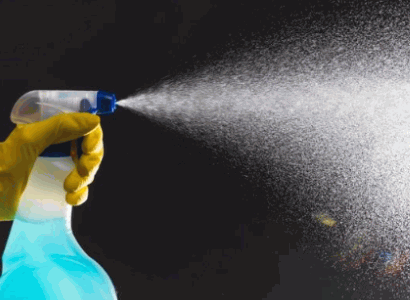
- Scrub brush: A stiff-bristled scrub brush will help to scrub away dirt and grime.
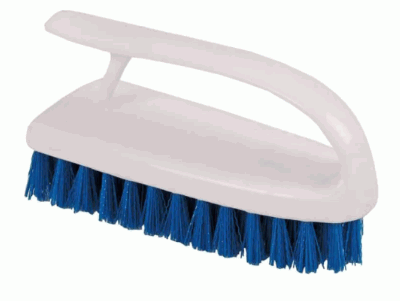
- Bucket: Fill a bucket with water to rinse the bricks after cleaning.
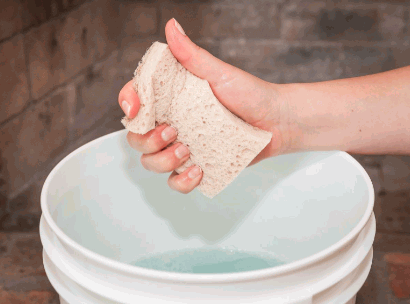
- Protective gear: Wear gloves, goggles, and a mask to protect yourself from any chemicals or debris.
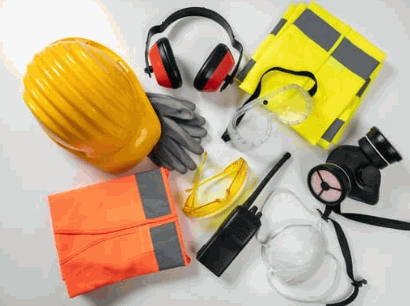
With these supplies, you'll be ready to effectively clean your bricks using vinegar.
Preparation Before Cleaning Bricks With Vinegar
Before you start cleaning bricks with vinegar, it is essential to prepare the surface properly to achieve the best results. In this section, we will explain the necessary steps to take before using vinegar as a cleaning agent. This involves checking for any damaged or loose bricks that may require repairs, as well as clearing away any debris or dirt from the bricks. By following these steps, you can ensure that your bricks are ready to be effectively cleaned with vinegar.
1. Check For Any Damaged Or Loose Bricks
To ensure the safety and effectiveness of cleaning bricks with vinegar, it is important to check for any damaged or loose bricks. Here is a step-by-step guide to follow:
- Inspect the bricks carefully for any signs of damage or looseness.
- If you find any damaged or loose bricks, mark them for repair or replacement.
- Before cleaning, it is crucial to fix any loose bricks or mortar to prevent further damage during the cleaning process.
By checking for any damaged or loose bricks beforehand, you can ensure a smoother and more successful cleaning process.
2. Remove Any Debris Or Dirt From The Bricks
Removing debris and dirt from bricks before cleaning is an important step to ensure effective results. Here are the steps to remove debris or dirt from bricks:
- Inspect the bricks for any loose or damaged pieces.
- Using a stiff brush or broom, sweep away loose dirt, leaves, or debris from the surface of the bricks.
- For stubborn dirt or debris, use a putty knife or scraper to gently scrape away any buildup.
- If there is moss or algae growth, use a mixture of water and bleach to scrub the affected areas.
- After removing the debris, rinse the bricks with water to remove any remaining dirt or cleaning solution.
By following these steps, you can ensure that the bricks are clean and ready for further cleaning with vinegar or any other method.
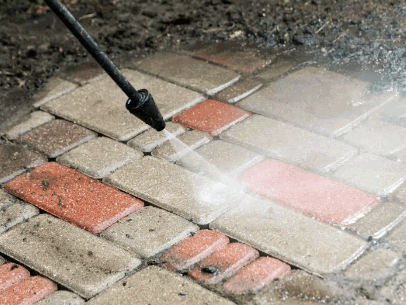
How To Clean Bricks With Vinegar?
When it comes to cleaning bricks, vinegar can be a powerful and environmentally friendly solution. But how do you use vinegar to effectively clean bricks? In this section, we will guide you through the step-by-step process of cleaning bricks with vinegar. From creating a vinegar-cleaning solution to properly scrubbing and rinsing the bricks, we will cover all the essential techniques you need to know to achieve sparkling clean bricks. Get ready to discover the power of vinegar for cleaning bricks!
Check out: How To Clean Blood From Carpet
1. Create A Vinegar Cleaning Solution
Creating a vinegar-cleaning solution for cleaning bricks is a simple process that involves a few easy steps.
- First, gather the necessary supplies, including white vinegar, water, a bucket, and a measuring cup.
- Measure equal parts of white vinegar and water, such as one cup of each, and pour them into the bucket.
- Mix the vinegar and water solution thoroughly to ensure they are well combined.
- Your vinegar cleaning solution is now ready to use for cleaning bricks.
2. Apply The Solution To The Bricks
When cleaning bricks with vinegar, follow these steps:
- Create a vinegar-cleaning solution by mixing equal parts vinegar and water.
- Apply the solution to the bricks using a spray bottle or a brush.
- Allow the solution to sit on the bricks for a few minutes to break down dirt and grime.
- Scrub the bricks using a brush or a scrubbing pad to remove any stubborn stains.
- Rinse the bricks thoroughly with water to remove the vinegar solution and any residual dirt.
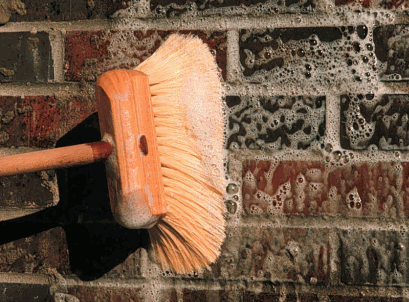
3. Scrub The Bricks With A Brush
To effectively clean bricks using a brush, follow these steps:
- Prepare the vinegar cleaning solution by mixing equal parts of vinegar and water.
- Dip the brush into the solution and apply it generously to the bricks.
- Gently scrub the bricks using the brush, focusing on any stains or dirt buildup.
- Use circular motions and apply pressure as needed to remove stubborn grime.
- Rinse the bricks thoroughly with water to remove any leftover solution and dirt.
By following these steps, you can effectively clean your bricks using a brush and vinegar solution. Remember to wear protective gear, test the solution on a small area, and rinse thoroughly with water for best results.
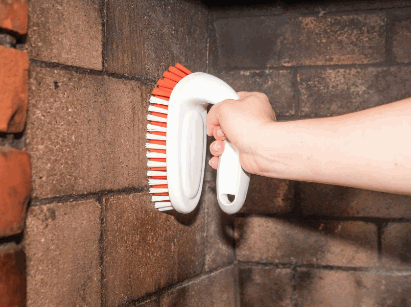
4. Rinse The Bricks With Water
- After scrubbing the bricks with a vinegar cleaning solution, the next step is to rinse the bricks with water.
- Use a hose or bucket of water to thoroughly rinse off the vinegar solution from the bricks.
- Make sure to remove all traces of the vinegar cleaning solution to prevent any leftover residue on the bricks.
- Rinsing the bricks with water will help remove any remaining dirt, debris, or vinegar solution that may be stuck on the surface.
- Ensure that you rinse all areas of the bricks, including corners and crevices, to achieve a clean and residue-free finish.
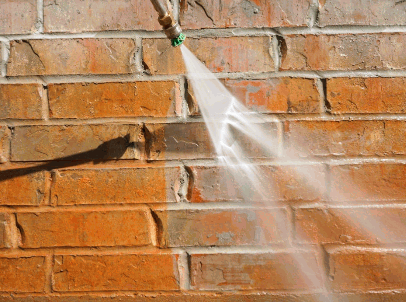
Alternative Methods For Cleaning Bricks With Vinegar
While vinegar is a popular and effective cleaning agent for bricks, there are alternative methods that can enhance its cleaning power. In this section, we will discuss two different approaches to cleaning bricks with vinegar. The first method involves creating a paste with vinegar and bicarbonate of soda, while the second method utilizes a pressure washer with vinegar. By exploring these alternative methods, you can find the best technique for achieving sparkling clean bricks.
1. Using A Vinegar And Baking Soda Paste
To clean bricks with a vinegar and baking soda paste, follow these steps:
- Mix equal parts of vinegar and baking soda to create a paste.
- Apply the paste onto the bricks, focusing on stained or dirty areas.
- Allow the paste to sit on the bricks for about 10-15 minutes to loosen dirt and grime.
- Scrub the bricks using a stiff brush or scrubbing pad to remove the dirt.
- Rinse the bricks thoroughly with water to remove any residue.
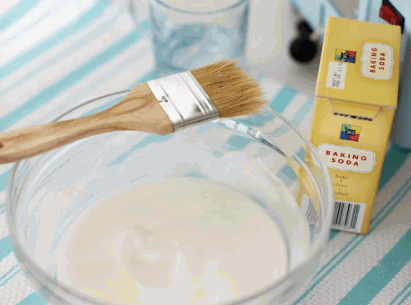
2. Using A Pressure Washer With Vinegar
Using a pressure washer with vinegar is an effective method for cleaning bricks. Here are the steps to follow:
- Prepare the pressure washer by connecting it to a water source and making sure it is in good working condition.
- Create a cleaning solution by mixing equal parts vinegar and water in a bucket.
- Attach a suitable nozzle to the pressure washer that provides a wide spray pattern.
- Apply the vinegar solution to the bricks using the pressure washer, starting from the bottom and working your way up.
- Use a back-and-forth motion to thoroughly clean the bricks, paying extra attention to stained or dirty areas.
- Allow the vinegar solution to sit on the bricks for a few minutes to loosen any dirt or grime.
- Rinse the bricks with clean water using the pressure washer, making sure to remove all traces of the vinegar solution.
- Repeat the process if necessary to achieve the desired level of cleanliness.
By following these steps, you can effectively clean your bricks using a pressure washer and vinegar.
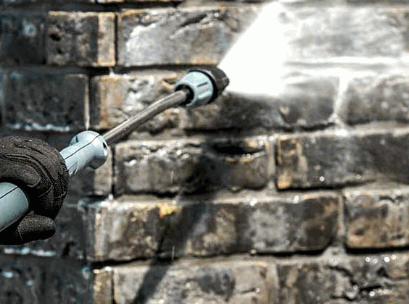
Precautions And Tips For Cleaning Bricks With Vinegar
While vinegar is a natural and effective solution for cleaning bricks, it is important to take certain precautions and follow some tips to ensure the best results. In this section, we will discuss the necessary steps to take before using vinegar to clean bricks. These include wearing protective gear, testing the solution on a small area first, and rinsing the bricks thoroughly with water. By following these precautions and tips, you can safely and successfully clean your bricks with vinegar.
1. Wear Protective Gear
When cleaning bricks with vinegar, it is important to prioritize safety by wearing protective gear. Follow these steps to ensure a safe cleaning process:
- Put on gloves, safety goggles, and a face mask to protect your skin, eyes, and lungs.
- Prepare a vinegar cleaning solution by mixing equal parts of vinegar and water.
- Apply the solution to the bricks using a spray bottle or a brush.
- Scrub the bricks gently with a brush to remove dirt and stains.
- Rinse the bricks thoroughly with water to remove any residue.
By following these precautions, you can safely clean your bricks using vinegar and achieve the desired results.
2. Test The Vinegar Solution On A Small Area First
Before using a vinegar solution to clean bricks, it is essential to test it on a small area first to ensure it does not cause any damage. Here is a step-by-step guide on how to proceed:
- Prepare the vinegar solution by mixing equal parts of vinegar and water.
- Select a small, inconspicuous area of the bricks to test the solution.
- Apply a small amount of the vinegar solution to the test area using a brush or sponge.
- Allow the solution to sit on the bricks for about 10-15 minutes.
- Gently scrub the test area with a brush to see if any damage or discoloration occurs.
- Rinse the test area thoroughly with water to remove the vinegar solution.
- Observe the test area for any adverse effects, such as fading or etching.
- If the test area shows no signs of damage, you can proceed with cleaning the rest of the bricks using the vinegar solution.
By testing the vinegar solution on a small area first, you can ensure the safety and effectiveness of the cleaning process.
3. Rinse Thoroughly With Water
To ensure proper cleaning of bricks with vinegar, it is important to rinse them thoroughly with water. Follow these steps for effective rinsing:
- Prepare a bucket or hose with clean water.
- Start at the top of the brick surface and work your way down.
- Use a brush or sponge to apply the water to the bricks.
- Gently scrub to remove any remaining vinegar solution.
- Rinse each section thoroughly to ensure all vinegar residue is removed.
- Continue rinsing until the water runs clear and there is no trace of vinegar left on the bricks.
- Allow the bricks to air dry completely.
By following these steps, you can effectively clean your bricks with vinegar and ensure they are left looking fresh and free of any residue.
